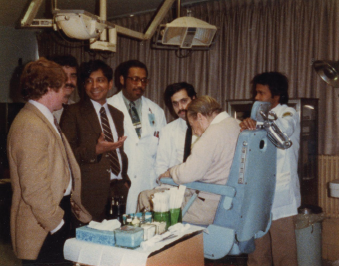Religion has very little to do with the actual practice of medicine, but it has shaped my attitude—specifically, my attitude toward other people, my respect for other people—that I not hurt anybody, either in my thoughts or in what I do. And these behaviors are at the core of my practice of medicine. —Ashok R. Shaha, MD
Explore This Issue
December 2019
SR: Your immigrant story is quite powerful. How did it feel to complete your residency for a second time?
AS: Yes, I did it twice, and it was hard both times. I will tell you, for all people it is a hard training. Surgical residency within otolaryngology and general surgery—it is all hard work. It was interesting because, to some extent, the second time around I was ahead of my peers. I already knew the subject matter very well. I knew how to care for patients and perform the surgeries. But, at the same time, I had a wife and a child, which were new challenges for me. I learned that what is most important is the understanding between husband and wife. If there is good understanding and support of each other, everything is easy. And, you know, my wife devoted quite a bit on my behalf. Because even though she is a pediatrician, she largely sacrificed her career for me. If that understanding between spouses is not there, then there are always going to be friction and clashes, especially when there are children. I think it is not easy to raise a child when both parents are working hard. It was much harder for my wife because she had to take care of our home and family. Without my wife, I could not have done it.
SR: Do you often look back on those years of completing residency training a second time, or do they feel like distant memories at this point?

Dr. Shaha, center, leading teaching rounds with his residents and medical students while chief of head and neck surgery at the Veterans Affairs Hospital in Brooklyn, N.Y., in 1988.
AS: Oh no, I remember those days very often, but, through the years, I have learned to keep a positive attitude. I think the United States is one place where, if you are good at what you do, if you work hard, the success is always there. I have never felt anybody pushing me down.
SR: You have told me that you hold deep religious beliefs from childhood. Do you think being a religious person has informed the way you practice medicine?
AS: Not really. Religion has very little to do with the actual practice of medicine, but it has shaped my attitude—specifically, my attitude toward other people, my respect for other people—that I not hurt anybody, either in my thoughts or in what I do. And these behaviors are at the core of my practice of medicine.
SR: Are there lessons you’ve learned through your training experiences that you feel are important to pass along to other trainees or to your colleagues?
AS: Yes. And I think of these points often: Face every new patient as a challenge. This is No. 1. Treat the patient just as you’d treat your own family. Make the best decisions that are in the interest of the patient, keeping in mind that every patient is unique. You must adjust your judgement based on the patient’s understanding of his circumstances, his disease, and remember to consider his quality of life. That is No. 1.
No. 2, enjoy what you are doing. Don’t think you are doing it either for money or that it is a chore. That is why I say, each day when I arrive to work in the morning, “I am going to have a good day.” And when I go home, I say, “It was a great day. I learned a lot, and I am where I want to be.” I think if you have that attitude, everything is simple.
SR: That is a commendable perspective. What do you do on days that are hard, when it is difficult to say, “Today was great”?
AS: There are hard days when you are frustrated with some complications. Surgeons are one community who do not like complications, and I lose sleep very easily when I have a complication. We all have had such moments. There is not a single surgeon who won’t experience that feeling. But you learn from every complication. And it makes you more humble every day.